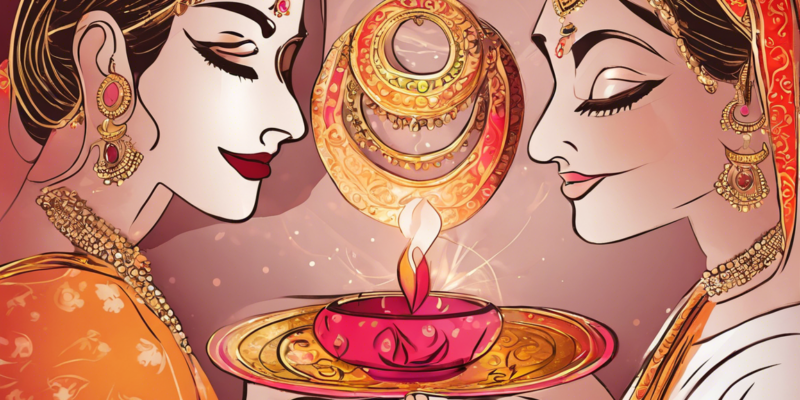Karwa Chauth is a traditional Hindu festival celebrated primarily by married women in North India. It holds immense significance as it symbolizes the love, dedication, and sacrifice that a wife makes for her husband. This day is marked by fasting from sunrise to moonrise, prayers, rituals, and a festive mood that highlights the bond between married couples. Not only does Karwa Chauth strengthen the marital relationship, but it also brings prosperity and longevity to the marriage.
The Significance of Karwa Chauth
Karwa Chauth is a festival celebrated on the fourth day after the full moon in the Hindu lunisolar calendar month of Kartika. The word ‘Karwa’ refers to a clay pot, symbolizing peace and prosperity, while ‘Chauth’ means the fourth day. On this day, married women observe a fast from sunrise to moonrise, without consuming food or water, to pray for the well-being and longevity of their husbands. The fast is broken only after sighting the moon and offering prayers.
Karwa Chauth holds cultural and religious significance, emphasizing the marital bond and the devotion of a wife towards her husband. It is believed that the fast ensures the well-being, prosperity, and longevity of the husband and strengthens the marital relationship. The rituals and traditions associated with Karwa Chauth vary from region to region but revolve around similar themes of love, sacrifice, and togetherness.
Preparations for Karwa Chauth
The preparations for Karwa Chauth begin days in advance, with women shopping for new clothes, jewelry, and other essentials for the occasion. Mehendi (henna) is applied on the hands and feet, adding to the festive spirit of the day. Married women receive ‘sargi’ from their mothers-in-law, which typically includes sweets, fruits, and other traditional foods to be consumed before sunrise, before beginning the fast.
On the day of Karwa Chauth, women wake up before dawn to have a traditional meal, perform puja (prayer ceremony) with the sargi thali, and take blessings from elderly family members. Throughout the day, they engage in various auspicious activities, such as listening to Karwa Chauth stories, applying sindoor (vermilion) and dressing up in traditional attire.
Rituals and Traditions
Karwa Chauth rituals are observed with great fervor and devotion by married women. The day involves intricate ceremonies that symbolize the unbreakable bond between husband and wife. Women gather in groups to perform the Karwa Chauth puja, where they worship the moon, apply mehendi, exchange gifts, and seek blessings from elders.
One of the key rituals of Karwa Chauth is listening to the Karwa Chauth vrat katha (story), which narrates the significance of the fast and the legendary tales associated with the festival. The fast is broken at night after sighting the moon, and the husband usually offers water and the first morsel of food to his wife to conclude the fast.
Celebrations and Festivities
Karwa Chauth is not just a festival; it is an occasion that celebrates the sanctity of marriage and the bond between partners. The day is marked by joyous celebrations, exchange of gifts, dressing up in traditional attire, and participating in cultural events. Families come together to partake in the festivities, strengthening their bonds and creating memorable moments.
During the evening, women dress in vibrant sarees or suits, adorn themselves with jewelry, and gather for the puja ceremony. The sight of women holding lit diyas (lamps), singing traditional songs, and performing rituals under the moonlit sky adds to the ethereal charm of Karwa Chauth celebrations. The day culminates in a grand feast with family and friends, where delicious dishes are savored after a day of fasting.
Importance of Moon Sighting
One of the most significant aspects of Karwa Chauth is the ritual of moon sighting. Women eagerly await the sighting of the moon as it symbolizes the end of their fast and the beginning of a prosperous and blessed married life. The moon holds great significance in Hindu mythology, and its presence on Karwa Chauth is believed to bring harmony, longevity, and happiness to the marital relationship.
FAQs (Frequently Asked Questions)
-
Can unmarried women observe Karwa Chauth?
Unmarried women can also observe Karwa Chauth for various reasons, such as wishing for a suitable life partner, enhancing their love life, or participating in the tradition. However, the rituals and significance may vary for unmarried individuals. -
What should be included in the sargi thali?
The sargi thali typically includes foods like fruits, sweets, nuts, and other traditional items like mathri, pheni, and meethi mathri. It varies from region to region and can be customized based on personal preferences. -
Is it necessary to observe Karwa Chauth for a husband’s long life?
While Karwa Chauth is a traditional and popular festival, the decision to observe the fast is a personal choice. It is not mandatory, but many women choose to observe it as a symbol of their love and devotion towards their husbands. -
What is the significance of applying mehendi (henna) on Karwa Chauth?
Applying mehendi on Karwa Chauth is considered auspicious and symbolizes love, beauty, and marital bliss. It is a traditional practice followed by married women to enhance the festive spirit of the occasion. -
How can families participate in Karwa Chauth celebrations?
Families can participate in Karwa Chauth celebrations by supporting married women in observing the fast, organizing puja ceremonies at home, exchanging gifts, preparing festive meals, and coming together for cultural activities and rituals.
Karwa Chauth is a festival that celebrates the timeless bond between husband and wife, embodying love, devotion, and commitment. It is a day filled with rituals, traditions, prayers, and festivities that not only strengthen the marital relationship but also bring families together in a spirit of joy and togetherness. The essence of Karwa Chauth lies in its celebration of love, faith, and the enduring bond that unites married couples in a sacred union.

Comments